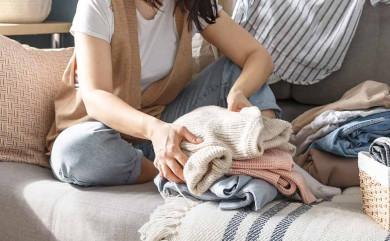Article from Issue #16 (December 7, 2019)
21 Tips for a Greener Festive Season
by Friends of the Earth

Source: Friends of the Earth
How to ease off the rampant consumerism – and save the planet's natural resources – without being a Scrooge at Christmas. Our 21 cockle-warming tips for a greener festive season.
Gifts
Christmas presents shouldn't cost the earth. From buying second-hand to choosing sustainable products (and avoiding companies that aren't eco-friendly), there are plenty of ways to show your loved ones, and the planet, a little love.
1. Gift the unexpected
There's nothing better than deviating from the usual socks and chocolates and surprising a loved one with a knock-out gift. Which is why we've partnered with The Guardian to sell a range of beautiful prints (like the one below) from artist activists.
2. A present for the planet
Mum, best mate, niece and nephew...
The planet may not be top of your Christmas list, but it needs your help. Despite government declaring a climate emergency, we haven't yet seen any real action.
So be kind to the planet this Christmas by making a donation to Friends of the Earth, either for yourself or as a gift to a loved one. You'll receive a personalised e-certificate and you'll be helping make sure real action is taken to protect our planet next year.
3. T-shirts, jumpers and totes
If you're buying presents for planet-loving friends and family, browse the Friends of the Earth Teemill store .
Every product is made from 100% organic cotton, in a factory powered by renewables. To save time and money, browse our new bundles.
4. Liforme yoga mats
How about a revolutionary 100% biodegradable yoga mat from the eco-friendly folks at Liforme? Mats are made from naturally-sourced sustainable rubber and a specially-engineered non-toxic polyurethane.
This Christmas, Liforme will donate 5% from each sale of its Purple Earth range of mats to Friends of the Earth.
5. The envy of the office
Be the envy of the office (or gym) with this beautiful ocean-themed steel bottle by Ion8. Healthy oceans are crucial for a health thriving planet so Ion8 are donating 25% profits of sales from this reusable bottle to support Friends of the Earth’s campaign to end plastic pollution.
6. Free gifts
Why spend money if you don’t have to? Pledge to do something nice instead. Free Christmas Gift Cheques
are a lovely way of making your time the thing that counts.
Trees
Up to 8 million Christmas trees are bought every December in the UK alone. That's a lot of intensive production, and potentially a lot of waste.
It's true that fake plastic trees last for years – and nowadays they can look very realistic. But they take enormous amounts of energy to manufacture. And it's yet more synthetic waste to be disposed of in the future.
So let's look at the options in more detail.
7. Tree rental
More and more places, such as garden centres and plant nurseries, now offer a Christmas-tree hire service over the festive season. They'll often even deliver and collect the tree to save you the hassle. And the tree can carry on growing after it's returned. Sounds like a good solution.
Just make sure it's grown sustainably by looking for either the FSC or Soil Association logo.
8. Use (or grow) your own
Using or buying a tree with roots lets you grow it outside and use it again next year, reducing its environmental impact and costing you less. Holly, apple, pear, bay and Japanese maple trees can all be bought in containers (though for best growth, ground planting is preferable).
They will need some looking after, and you'll need a big pot, so read these expert tips on caring for Christmas trees in pots.
Alternatively, get a large perennial indoor plant – like a yucca, palm or ficus – and just decorate it at Christmas time.
9. Artificial trees
If you've got a fake tree already, keep using it – make it last as long as possible. But look into more environmentally-sound options when it eventually comes to replacing it.
If you do want to get a fake one, for whatever reason, try Freegle, Freecycle , eBay or Gumtree for a pre-loved one.
10. Real trees
If you want to be reassured that your tree has been grown sustainably, not in a way that's environmentally damaging, look for the FSC-certification
logo. Just like the rented tree, if you want one that's certified as organic and pesticide-free, get one that's approved by the Soil Association.
11. Recycling real trees
Far more Christmas trees get recycled now than even 10 years ago. Most councils have allocated locations where people can leave their tree after Christmas (take the decorations off first). Or you can usually take them to your nearest municipal tip/recycling centre.
The trees are shredded, then used as mulch on plants in parks, or on woodland paths (for a lovely instant pine-forest smell). Or else rotted down and recycled as compost.
Food
Why not try cutting down meat this Christmas – at least for some days of the festive break? According to the Soil Association, "food is the single most important, everyday way for people to reduce their own environmental impact". Here are some alternative festive food tips to help you shop and cook for an Earth-friendly feast.
12. Vegetarian and vegan recipes
Nowadays veggie doesn’t have to mean predictable omelettes, cheese salads or risottos. Or even necessarily the standard nut roast for vegans at Christmas.
Have a look at some of the recipes our staff and supporters have sent in, or head over to the excellent Vegan Food & Living for hundreds of fantastic recipes. And there are some extra tasty festive treats on the Vegan Society website – including vegan brandy butter, and even vegan eggnog.
13. Organic meat
If you can't get past the meat craving, try choosing organic and free-range, and support small-scale farming wherever possible.
It might be a bit more expensive, but it's better to buy less than more of the cheap and cheerless intensively-farmed meat. Companies like our partner, Abel & Cole, run dependable organic delivery schemes, and they offer seasonal veg, meat and dairy packages.
14. Cut food waste
When you're food shopping, try and choose things that are light on packaging, or buy loose items.
And if you end up over-catering, don't just bin what's left. Transforming leftovers can be a great way to create new meals, save money and cut waste. Try the BBC Good Food leftovers recipes for ideas – or challenge your family to suggest recipes with whatever you’ve got in the fridge.
If you have too many leftovers, see what you can freeze. Or why not donate some to an elderly neighbour, local food bank or soup kitchen? Compost any other waste.
For more ideas, see our page on solving the problem of food waste, and also the Love Food Hate Waste
website.
15. Merrier mulled wine
If you’re entertaining friends, mulled wine is a great festive treat – but try and look out for organic and vegan wines for the most sustainable options.
Decorations
Most of us love a bit of festive decoration and fancy wrapping, and who doesn't like getting Christmas cards? But research suggests that the paper waste over the Christmas period is equivalent to 5-12 million litres of biofuel – enough to power a bus to go to the moon 20 times.
So why not recycle or make your own Christmas decorations? Foraging for pine cones and holly is the perfect excuse to enjoy the great outdoors and keep kids busy, if there's any around. And if you share your winter walks with us on social media, we'll send you extra Christmas joy!
16. Scarf folding and other green gift wrapping
Lots of wrapping paper contains plastic. Opt for the understated elegance of brown parcel paper tied up with string – adding natural decorations like spruce or homemade cookies.
Alternatively, try a scarf. No really. Someone somewhere came up with the ingenious idea of using a scarf to wrap a present – and the results are pretty amazing .
17. DIY cards
An unbelievable 1.5 billion Christmas cards are thrown away by UK households each year, according to Imperial College researchers.
E-cards (sent online) are an increasingly popular alternative. They cut your carbon footprint, save trees and save money.
Alternatively, pick up some supplies when you're next in the forest and try your hand at making leaf-pressed cards.Remember to avoid glitter on your cards, as they contain harmful microplastics. Instead, decorate with eco-glitter, or watercolour paint.
18. Have a crafty Christmas
How do you fancy creating your own edible Christmas decorations,
or a homemade Advent calendar?
Or even making a natural Christmas wreath
from carefully foraged materials? It’s a great excuse to have fun, and keep kids busy, if there's any around. You can also try getting creative with dried fruit peel, pine cones, Christmas tree offcuts and the like.
Leisure and travel
Here are some fun and mostly free things to do during the festive break, with minimal cost to the environment.
19. Festival winter walks
The Ramblers website
is a great resource if you're looking for local walking groups or routes. Or check out the Woodland Trust for information on where to go for a frosty forest walk. The National Trustoffers a full calendar of festive activities and events around Christmas, in some of Britain’s most stunning country parks and homes.
20. Share transport
Make Christmas travel greener by sharing shopping trips and lifts with friends and family. Use public transport, or shop online and get bulk deliveries.
21. Get on your bike
Turn your Christmas holiday into a green getaway. The UK has lots of wonderful outdoor cycling opportunities. Escape Routes by Matt Carroll
has 60 scenic routes for both day-trips and longer weekend breaks.


 How to Make a Sustainable Halloween Costume
How to Make a Sustainable Halloween Costume Guide to Recycling Old Clothes Around the House
Guide to Recycling Old Clothes Around the House The Lazy Person's guide to Saving The World
The Lazy Person's guide to Saving The World